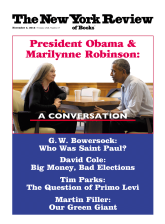In response to:
The Religious Specter Haunting Revolution from the June 4, 2015 issue
To the Editors:
In Michael Ignatieff’s interesting review of Michael Walzer’s The Paradox of Revolution [NYR, June 4], he and Walzer overlook a major factor in the failure of liberal democracy to take root in Israel, namely the tensions of the cold war. The liberal camp was divided between David Ben-Gurion’s Mapai social democratic party, which had a plurality but not a majority in the Knesset, and Mapam (a Hebrew acronym for United Workers’ Party), a Zionist-Marxist party with a pro-Soviet orientation, led by Meir Ya’ari. Their positions on expulsion of the Arab population and their belief that Soviet Russia held the key to the future made it impossible for them to be included in the coalition formed after the 1949 election. As a result, Ben-Gurion had no recourse but to build a coalition with the fundamentalist religious parties with the resulting erosion of democratic values.
The rude awakening from Stalinism driven by the 1953 Prague show trials came too late to make a substantive change. Upon the death of Stalin, the Mapam newspaper came out with black borders and the headline “The Sun of the Nations Has Set.” By 1955 reality had taken hold, but it was already too late.
Walzer is right about the role of condescension. Immigrants from countries in the Arab world were looked down upon by the population of European descent and found their way to the right-wing parties, whose political descendants, such as Benjamin Netanyahu’s neocon Likud and Naftali Bennet’s religious Bayit Yehudi, continue to rule Israel. Liberals in Israel constitute at most 13 percent of the electorate. Ignatieff’s optimism appears to be misplaced with respect to the political future of Israel.
Aharon Eviatar
Professor Emeritus
Tel Aviv University
Tel Aviv, Israel



